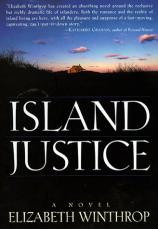Reading Group Guide
Discussion Questions
Island Justice

1. In Island Justice the author seems to be presenting us with two women in different stages in their lives. Compare the characters and the life circumstances of Anna Craven and Maggie Hammond. In what ways are they different and in what ways do they resemble each other?
2. What is the meaning of the title?
3. The story is related from the point of view of an omniscient narrator. How does this affect your concept of the characters and your understanding of their daily lives? If the author had chosen to tell this story from one person's point of view, how would that decision have changed the story?
4. Some people have called Sam Matera, the naturalist, the hero of this book. Do you agree? How does the author relate the natural ecosystem of a New England island to the problems of the human community? What is the meaning of the last sentence of the book?
5. In an interview, the author has said that in every one of her heroes there is a villain, and in every villain there is a hero. Do you find this to be true of her characters? Discuss this concept in connection with Lauren Root, Al Craven, Sam Matera, and Dennis Lacey.
6. What message was Nan Phipps trying to give to her goddaughter, Maggie, when she willed her the large Victorian house? Does Maggie ever get the message?
7. Al Craven is proud of the fact that he never hits his wife, Anna. Why is this so important to him? Do you think Anna is an abused woman? How does Erin's parents' relationship affect her?
8. There are many secondary characters peopling this book -- Chuck Montclair, Miss Yola, Lauren Root, the Tremayne boys, Dennis Lacey. What role does each of them serve? If the author decided to write another novel about one of these people, who would you advise her to choose and why?
9. Why do you think the author chose not to give this island a name or pinpoint its geographical location?
10. The islanders are proud of their insularity. We take care of our own, they are fond of saying. Do you think their form of justice is more or less effective than the legal systems available to those of us who live on the "mainland"? Why?
11. The author is writing about a place that is cut off from the mainland, but is also, in many ways, cut off from itself. What do you think the author is saying about community?
12. In any part of your life -- work, home, church, your book group --- do you live in an insular community like this one? How is it the same as the community in Island Justice? How is it different?
Island Justice
- Publication Date: March 1, 2013
- Paperback: 356 pages
- Publisher: Quill Press
- ISBN-10: 0688169686
- ISBN-13: 9780688169688







